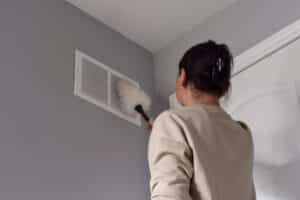Hydronic heating systems are a popular method of heating in Australia. They’re known for their ability to efficiently distribute heat throughout the home, which makes it ideal for those living in colder climates of Australia. However, like any home appliance, they can encounter issues that may affect their performance.
These are some ways to troubleshoot common issues with your hydronic heating system you can do yourself before calling out an expert. It may be a small issue you can fix or you may need to call out a hydronic heating technician, like our team at Hyde Heating & Cooling. We also answer some of our most frequently asked questions about this common heating solution in Australia to help you have as many answers as you need.
Common Issues with Hydronic Heating Systems & What Causes Them
1. No heat being produced.
If your hydronic heating system is not producing heat, it is likely due to a problem with your boiler. One of the common causes is an issue with the pilot light or the ignition system.
To troubleshoot a problem with heat being produced by your hydronic heating system, check if the pilot light is on and if it isn’t, try to reset the ignition. If it still won’t light, it may be a problem with the thermocouple. In any case, it is best to seek the help of a professional (like our team at Hyde Heating & Cooling) to properly diagnose the problem before attempting any repairs.

2. Uneven heating.
If your hydronic heating system is producing heat, but you notice some rooms are warmer than others, then there may be an issue with the balancing of your system. Balancing involves adjusting the flow of water to each radiator according to the size of the room and the amount of heat needed. Improper balancing can result in uneven heating.
Uneven heating problems are one of the most common problems with hydronic heating systems, but can easily be solved majority of the time.
If you notice this issue, try to balance your heating system by adjusting the valves on each radiator.
3. Strange noises.
If you hear strange noises such as gurgling or banging coming from your hydronic heating system, this may indicate a problem with your pipes or radiators. These noises are usually caused by air or debris in the system.
To address the problem, you need to bleed your radiators to remove any trapped air inside. If the noise continues, then it may be a sign of a more severe problem. In this case, it is best to seek the help of your local hydronic heating specialist.
4. Low water pressure.
Low water pressure can affect the performance of your hydronic heating system. If you notice low water pressure in your system, it is likely due to a problem with your boiler pressure. The most common cause of this issue is a leak in your system. Check for any visible leaks in the pipes or radiators. If you can’t locate any leaks, it is best to let a professional check your system to avoid further damage.
5. Frozen pipes.
Lastly, during the colder months, frozen pipes can be a common issue with hydronic heating systems. Frozen pipes can cause damage to your heating system and can lead to costly repairs. If you notice frozen pipes, turn off your heating system immediately to prevent further damage. Attempting to thaw the pipes on your own can result in more damage. Seek the help of a hydronic heating professional to address the issue.

How to Prevent Issues with Your Hydronic Heating System
Regular maintenance.
To help prevent issues with your hydronic heating system, booking in annual maintenance inspections with your installer will help keep your system running as it should. They will be able to check for any leaks, ensure even heating and check you’re happy with how your system is heating your home.
Aside from your annual service, you should also check your heating system once a month. Things to check for each month include:
- Calcium deposits or rust on the furnace or boiler.
- System water levels to ensure they’re always at an appropriate level.
- Any leaks.
- For those more experienced with the system, draining the boiler and adding oil to the pump motor.
If you notice anything out of the ordinary, the sooner you call out a technician the better.
Home insulation.
Insulating your home, including caulking cracks in windows and doors, as well as insulating walls and ceilings, will help keep warm air inside the home. By insulating your home, you can help get the most effective performance from your heating system, so it heats your home as well as possible. If you’re experiencing poor heating in a new system or even an older system, check if your home is properly insulated and trapped in all that hot air.
Programmable thermostats.
Using a programmable thermostat will allow you to regulate the temperature and reduce energy consumption. For example, if you are not home during the day, you can program the heating system to be off during those hours, but turning on and heating prior to your regular arrival home. This will help lower your heating costs and premature wear from being on all day and night to keep your home warm.
Zoning.
Zoning your hydronic heating system gives you flexibility and more control over where you’re heating in your home and when. You can set up different zones in your home, either room to room, or different zones within a larger room, with thermostats allowing you to control the temperature in each zone.
Hydronic heating zoning allows more effective heating to where you spend time in your home. It helps save on your heating bills and prevents premature ageing of your system by only using it when you need it.
Frequently Asked Questions About Hydronic Heating Systems
How do I find a leak in my hydronic heating system?
There are a few different ways to find a potential leak in your hydronic heating system, including:
– Checking for visible leaks, such as water dripping or pooling around the boiler or pipes.
– Using a thermal camera to detect hot spots created by leaks pooling not present to the naked eye (such as behind walls).
– Shutting off the system and waiting for the pipes to cool down to check for signs of moisture or leaks around the pipes.
– Checking the pressure gauge, as a lower reading may indicate a leak.
– Using a heat tracer to see where water is flowing.
Overall, finding a leak in your hydronic heating system can be challenging, but it’s important to address any leaks promptly to prevent damage to your home and system. It’s recommended to consult with a professional hydronic heating technician to evaluate your system and determine the best course of action for your home.
What is the life expectancy of a hydronic heating system?
The estimated lifespan of a modern hydronic heating system is 15 to 20 years, but can vary depending on the initial installation, the quality of the system and how well it’s been maintained. Well-planned and maintained hydronic systems may last longer than the average system, while electric systems tend to last less than a gas system.
Overall, the life expectancy of a hydronic heating system can vary depending on several factors, but most systems can be expected to last between 15 and 20 years with proper maintenance and care.
Can you use untreated water in a hydronic heating system?
o, it’s not recommended to use untreated water in a hydronic heating system. Untreated water can cause:
– Corrosion.
– Air pockets.
– Sludge build-up.
– Legionella risk.
And other common issues with hydronic heating systems.





